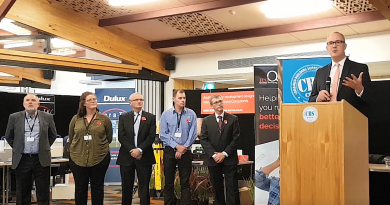Nearly one third of NZ construction companies not complying with retentions law
The NZ Specialist Trade Contractors Federation (NZSTCF) is concerned by findings of the 2018 BDO Construction Survey, which revealed that nearly one third of construction companies in New Zealand don’t seem to be complying with the new retentions law.
Graham Burke, President of NZSTCF, says this is not good enough and the sector and Government need to act.
“We advocated for a new retention regime to better protect subcontractors when events, such as the Ebert Construction collapse, happen. The new regime came into effect on 31 March last year and we are waiting to see its impacts on the sector,” says Burke.
“While we have been assured that Ebert retentions are available, we are concerned that this is not the case with a large proportion of companies. The recent survey by BDO revealed that many companies are not complying with the law. Subcontractors need to use the powers in the act to protect themselves and the Government need to hold contractors who do not comply to account.”
Burke says non-compliance with retention law is just one of a myriad of issues facing the sector. “The system is broken and we need a new model. We have had more than 20 years of financial failures. There is not enough cash in the system, contractors have no certainty, margins are too low and they are taking on too much risk,” says Burke.
Burke says NZSTCF is committed to working closely with the industry to transform the sector. “No one is winning in the current environment. Head contractors are being forced to tender fixed prices on open ended projects, which is a particular problem on design and build projects. Tenders are being agreed with minimal documentation as far as scope combined with incredibly complex contracts which push all risk from the client to the contractor and supply chain.
“The construction sector is failing to understand and manage risk. This is having a huge impact on our members – the subcontractors, who are too often being left unpaid for the work they have done. “The current approach is unsustainable and will result in more subcontractors leaving the sector. At a time when New Zealand needs more capacity in the construction sector, we believe this should be a major priority for both Government and the industry.”
Site Safe New Zealand is pleased to announce the appointment of a new Chief Executive. Brett Murray has been appointed as the not-for-profit’s new Chief Executive and will take over from outgoing Chief Executive, Alison Molloy, on September 3.
Site Safe Chairman Peter Jackson said he was delighted to announce Mr Murray’s appointment. “Brett brings an extensive knowledge of health and safety, and a wealth of experience to the position. We are confident his leadership abilities and understanding of the health and safety environment make him the right person to guide Site Safe through the next stage of our journey as an organisation.”
Mr Murray’s background in health and safety includes several senior roles with WorkSafe, MBIE and the Department and Labour. Most recently, as General Manager Operations at WorkSafe, he was responsible for WorkSafe’s inspectorate and technical support functions. While Central Region Manager at the Department of Labour, he headed the investigation into the Pike River disaster and as GM High Hazards and Specialist Services with MBIE, later went on to establish the High Hazard Unit, which provides specialist oversight of New Zealand’s petroleum, extractives and major hazard facilities sectors.
Mr Murray said he was looking forward to the opportunity to work closely with the construction industry and government agencies to lift health and safety performance. “Safe and healthy workplaces are productive workplaces. I firmly believe good health and safety practices are the cornerstone of operational excellence and that the construction sector can lead the way in New Zealand being recognised as a safe country to work in.
“Site Safe already plays a key role in supporting positive change in the sector. I am excited about the platforms and opportunities that will provide the organisation the opportunity to grow as a change leader and influencer, both within the industry and more broadly with government and other key stakeholders.”
Mr Jackson thanked outgoing Chief Executive, Alison Molloy, for her contribution to health and safety and to the industry. “I’d like to take this opportunity to acknowledge Alison’s outstanding dedication to improving health and safety in New Zealand construction over the past five years. We wish her every success for the future.”
Source: AWCI
AWCI NZ is a trade association which represents the interests of building professionals and organisations operating in the wall and ceiling industries.




